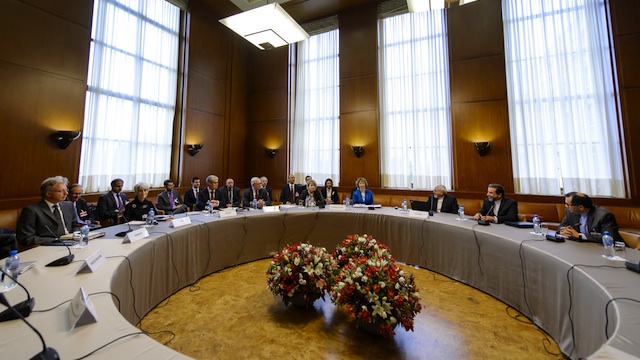SUMMARY
This is AI generated summarization, which may have errors. For context, always refer to the full article.

GENEVA, Switzerland – Iran on Wednesday, October 16, said it could allow for snap inspections of its nuclear sites as part of a new proposal to end a decade-long standoff with world powers, adding that fresh talks would take place “in a few weeks”.
Iranian Foreign Minister Mohammad Javad Zarif’s announcement of a fresh round of talks came as negotiators from the EU-chaired P5+1 group – the US, Britain, France, China and Russia, plus Germany – pored over a proposal he and his team presented in Geneva a day earlier.
“The continuation of the negotiations will be in Geneva in a few weeks,” Zarif wrote on Facebook.
“In the meantime, the P5+1 members will have the opportunity to (study) the details of Iran’s proposals and prepare actions they need to take,” he said.
“Negotiations and reaching a resolution is difficult, and negotiating over details requires time and great deliberation.”
The two-day talks in the Swiss city have ended a 6-month freeze in negotiations over Iran’s refusal to curb uranium enrichment in exchange for easing the international sanctions battering its economy.
The nuclear meetings are the first since Iranian President Hassan Rouhani, seen as a relative moderate, succeeded conservative Mahmoud Ahmadinejad in August.
Amid signs of a thaw with the international community, Rouhani has pledged transparency on the nuclear programme and engagement with major powers to try to get the sanctions lifted.
Western powers and Iran’s arch-foe Israel fear the atomic programme is a disguised effort to build a nuclear bomb, a claim Tehran denies.
Details of the new proposal are being kept under wraps, but Iran’s lead nuclear negotiator Abbas Araqchi told reporters on Tuesday it had the “capacity to make a breakthrough”, and all sides have noted the positive atmosphere of the talks.
Iran’s new plan contains three steps that could settle the nuclear dispute “within a year”, Araqchi has said, the first achievable “within a month or two, or even less”.
Iran’s state news agency IRNA on Tuesday quoted Araqchi as saying that snap inspections of its atomic sites were not part of the proposal, but on Wednesday the official clarified those remarks, saying unannounced visits were on the table.
“None of these issues exist in the first step, but they are part of our last step,” IRNA quoted him as saying.
Iran has drawn other red lines, however, saying it will not accept demands to suspend uranium enrichment or ship stockpiles of purified material abroad.
On Wednesday, EU spokesman Michael Mann said negotiators were meeting for a continuation of “technical work” from the first day of talks.
Israel, the Middle East’s sole if undeclared nuclear-armed power, has viewed the easing tensions with concern, with one minister comparing the situation to pre-war Europe and the appeasement of Nazi Germany.
Israel has not ruled out a military strike to halt Iran’s drive.
Israel warns of ‘another Munich’
Western negotiators insist they are serious about not leaving room for a nuclear-armed Iran, but they have voiced cautious optimism.
On Tuesday, US State Department spokeswoman Jen Psaki said it was “positive that there was enough information to have technical discussions”.
A senior US official in Geneva noted that any easing of sanctions would be “proportional” to what Iran pledged, with “concrete, verifiable actions” needed.
The EU’s Mann said the ball remained in Tehran’s court, but hailed the “very different” atmosphere from past talks.
In another sign of a changing mood on the international stage, IRNA reported that Iran and Britain have agreed to upgrade their diplomatic ties following a direct meeting between officials in Geneva.
The rapprochement comes after Zarif held a landmark meeting with US Secretary of State John Kerry during the UN General Assembly in New York last month, when Rouhani also spoke on the telephone with US President Barack Obama.
Araqchi met with his US counterpart Wendy Sherman on Tuesday, in the first one-on-one talks between nuclear negotiators from the two countries since 2009.
But Israel’s International Relations Minister Yuval Steinitz said the country was watching the talks “with hope and with concern”.
“We see the worrying signs and we don’t want Geneva 2013 to turn into Munich 1938,” he said on Israel’s army radio, referring to Britain and France’s failed bid to avert war by agreeing to Nazi Germany’s annexation of swathes of Czechoslovakia. – Rappler.com
Add a comment
How does this make you feel?
There are no comments yet. Add your comment to start the conversation.